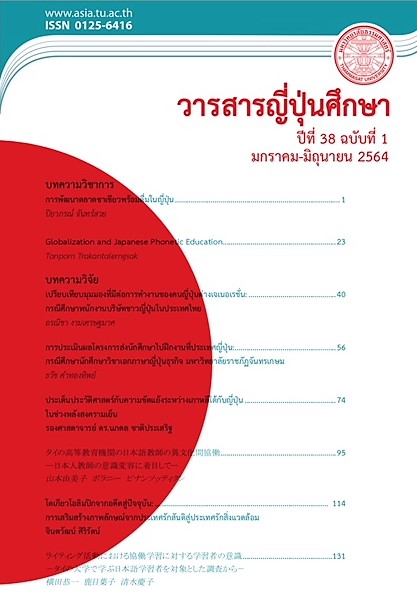โตเกียวโอลิมปิกจากอดีตสู่ปัจจุบัน
การเสริมสร้างภาพลักษณ์จากประเทศรักสันติสู่ประเทศรักสิ่งแวดล้อม
คำสำคัญ:
ญี่ปุ่น, โตเกียวโอลิมปิก, ภาพลักษณ์, การพัฒนาอย่างยั่งยืนบทคัดย่อ
การเป็นเจ้าภาพกีฬาระหว่างประเทศไม่ใช่แค่เรื่องของกีฬาเท่านั้น แต่ยังเป็นเวทีสำหรับบรรลุเป้าหมายแห่งชาติด้วย ซึ่งเมื่อวิเคราะห์การเป็นเจ้าภาพโอลิมปิกฤดูร้อนของญี่ปุ่นผ่านแนวคิดกีฬาใน Soft Power พบว่า การส่งเสริมภาพลักษณ์ผ่านโอลิมปิกของญี่ปุ่นมีความสัมพันธ์กับสภาพแวดล้อมระหว่างประเทศในขณะนั้น กล่าวคือ ในการเป็นเจ้าภาพโตเกียวโอลิมปิกปี 1964 ญี่ปุ่นได้ส่งเสริมภาพลักษณ์ความเป็นประเทศรักสันติที่เน้นการพัฒนาเศรษฐกิจเป็นหลัก เพื่อขจัดภาพลักษณ์ของประเทศผู้ก่อสงครามและส่งเสริมความเป็นมิตรกับทุกประเทศ ขณะที่ในการเป็นเจ้าภาพโตเกียวโอลิมปิกปี 2020 ญี่ปุ่นได้ส่งเสริมภาพลักษณ์ในฐานะประเทศที่มีบทบาทนำด้านสิ่งแวดล้อม ซึ่งเป็นการผสานระหว่างค่านิยมของชาติกับยุทธศาสตร์ของคณะกรรมการโอลิมปิกสากล อีกทั้งยังเป็นช่วงเวลาที่ประชาคมโลกหันมาให้ความสำคัญกับการพัฒนาอย่างยั่งยืนมากขึ้น โอลิมปิกปี 2020 จึงเป็นเวทีสำหรับเสริมสร้างอำนาจ soft power ของญี่ปุ่นในฐานะประเทศที่ส่งเสริมค่านิยมการพัฒนาที่เป็นมิตรกับสิ่งแวดล้อม
Downloads
เอกสารอ้างอิง
Abel, J. R. (2012). Japan's sporting diplomacy: The 1964 Tokyo Olympiad. The International History Review, 34(2), 203-220.
Allen Pigman, G., & Simon Rofe, J. (2014). Sport and diplomacy: An introduction. Sport in Society, 17(9), 1095-1097.
Baade, R. A., & Matheson, V. A. (2016). Going for the gold: The economics of the olympics. Journal of Economic Perspectives, 30(2), 201-218.
Black, D., & Peacock, B. (2013). Catching up: Understanding the pursuit of major games by rising developmental states. In J. A. Mangan, S. Collins, & G. Ok (Eds.), The triple Asian olympics: Asia rising-the pursuit of national identity, international recognition and global esteem (pp. 45-63). Abingdon, OX: Routledge.
Cha, V. D. (2009). A theory of sport and politics. The International Journal of the History of Sport, 26(11), 1581-1610.
Constandt, B., & Willem, A. (2021). Hosting the olympics in times of a pandemic: Historical insights from Antwerp 1920. Leisure Sciences, 43(1-2), 50-55.
Droubie, P. (2013). Phoenix arisen: Japan as peaceful internationalist at the 1964 Tokyo Summer Olympics. In J. A. Mangan, S. Collins, & G. Ok (Eds.), The triple Asian olympics: Asia rising-the pursuit of national identity, international recognition and global esteem (pp. 83-96). Abingdon, OX: Routledge.
Featherstone, M., & Tamari, T. (2019). Olympic games in Japan and East Asia: Images and legacies: An introduction. International Journal of Japanese Sociology, 28(1), 3-10.
Gallego, V., Nishiura, H., Sah, R., & Rodriguez-Morales, A. J. (2020). The COVID-19 outbreak and implications for the Tokyo 2020 Summer Olympic Games. Travel Medicine and Infectious Disease, 1-3.
Grix, J., & Houlihan, B. (2014). Sports mega-events as part of a nation's soft power strategy: The cases of Germany (2006) and the UK (2012). The British Journal of Politics and International Relations, 16(4), 572-596.
Guajardo, M. (2016). Tokyo 2020 Olympics: Nation branding creates an opportunity for a new cultural narrative for Japan. Paper presented at the The International Conference on Japan and Japan Studies 2016.
Honjo, T., Seo, Y., Yamasaki, Y., Tsunematsu, N., Yokoyama, H., Yamato, H., & Mikami, T. (2018). Thermal comfort along the marathon course of the 2020 Tokyo Olympics. International Journal of Biometeorology, 62(8), 1407-1419.
International Olympic Committee. (2017). IOC sustainability strategy. Retrieved March 20, 2021 from https://www.olympic.org/sustainability
International Olympic Committee. (2020). Sapporo 1972: A city transformed, a continent inspired. Retrieved November 5, 2020 from https://www.olympic.org/news/olympic-legacy/sapporo-1972/sapporo-1972-a-city-transformed-a-continent-inspired
Kakamu, T., Wada, K., Smith, D. R., Endo, S., & Fukushima, T. (2017). Preventing heat illness in the anticipated hot climate of the Tokyo 2020 Summer Olympic Games. Environmental Health and Preventive Medicine, 22(1), 1-6.
Lauermann, J. (2020). Visualising sustainability at the olympics. Urban Studies, 57(11), 2339-2356.
Nakamura, H., & Suzuki, N. (2017). Reinterpreting olympic legacies: The emergent process of long-term post-event strategic planning of Hakuba after the 1998 Nagano Winter Games. International Journal of Sport Policy and Politics, 9(2), 311-330.
Nikkei Asia. (2019). Tokyo Olympics budget swells to $12bn a year before games. Retrieved October 10, 2020 from https://asia.nikkei.com/Spotlight/Tokyo-2020-Olympics/Tokyo-Olympics-budget-swells-to-12bn-a-year-before-games
Nye, J. S. (2004). Soft power: The means to success in world politics. New York: PublicAffairs.
Nygård, H. M., & Gates, S. (2013). Soft power at home and abroad: Sport diplomacy, politics and peace-building. International Area Studies Review, 16(3), 235-243.
Presti, V. L. (2014). Moving towards Tokyo 2020: Sport as a vehicle of social inclusion. European Journal of Sport Studies, 1(1), 1-12.
Sato, S., Oshimi, D., Bizen, Y., & Saito, R. (2020). The COVID-19 outbreak and public perceptions of sport events in Japan. Managing Sport and Leisure, 1-6.
Shimizu, S. (2014). Tokyo - bidding for the olympics and the discrepancies of nationalism. The International Journal of the History of Sport, 31(6), 601-617.
Singh, B. (2013). Japan's security identity: From a peace state to an international state. New York: Routledge.
The New York Times. (1964). Olympic village in Tokyo opened; living quarters for athletes resemble a U.S. Suburb. Retrieved October 1, 2020 from https://www.nytimes.com/1964/09/16/archives/olympic-village-in-tokyo-opened-living-quarters-for-athletes.html
Tokyo 2020. (2018). Tokyo 2020 Olympic and Paralympic Games sustainability plan version 2. Retrieved October 15, 2020 from https://tokyo2020.org/en/games/sustainability/sus-plan
Tokyo 2020. (2020a). Sustainability progress report. Retrieved November 30, 2020 from https://gtimg.tokyo2020.org/image/upload/production/dpmsi7vxksqzouhwdsdz.pdf
Tokyo 2020. (2020b). Tokyo 2020 sustainability. Retrieved November 30, 2020 from https://tokyo2020.org/en/games/sustainability/
Wu, Y., Graw, K., & Matzarakis, A. (2020). Comparison of thermal comfort between Sapporo and Tokyo—the case of the Olympics 2020. Atmosphere, 11(5), 1-13.
Yu, Y., & Liu, J. (2013). A comparative analysis of the olympic impact in East Asia: From Japan, South Korea to China. In J. A. Mangan, S. Collins, & G. Ok (Eds.), The triple Asian olympics: Asia rising-the pursuit of national identity, international recognition and global esteem (pp. 64-82). Abingdon, OX: Routledge.




